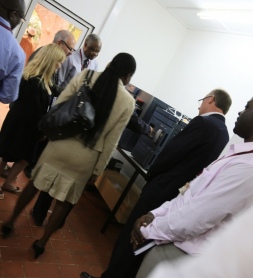Donation brings metabolic profiling to Africa to fight liver disease

Imperial researchers will use a mass spectrometer donated by Waters Corporation to improve liver cancer diagnosis - News
Wednesday 6 June 2012
By Sam Wong
Scientists working to develop a urine test to identify patients at risk of liver cancer in Africa have received a huge boost after a scientific instrument manufacturer donated a mass spectrometer to laboratories in the Gambia.
See also:
Related news stories:
The gift from Waters Corporation will allow the researchers to analyse samples from people with hepatitis B infection to identify chemical markers of cancer and liver fibrosis, which can be treated if detected early. Researchers from Imperial College London are among those who will be using the technology as part of a five-year, 3 million-euro research project that aims to reduce the incidence of liver cancer by treating chronic hepatitis B infection. This European Union-funded project, called PROLIFICA, involves institutions from six countries in Europe and Africa.
Hepatitis B is a viral infection transmitted through bodily fluids that attacks the liver. Despite being preventable with a vaccine, infection is endemic in sub-Saharan Africa and about one in four adults with chronic infection die of liver cancer or cirrhosis. Worldwide, an estimated 350 million people live with chronic infection and around 600,000 people die of its effects each year.
Preliminary studies have identified urinary biomarkers that might help doctors to detect cancer at an early stage when it is treatable, but more research is needed to validate these findings and make further progress towards developing a cheap and reliable diagnostic test.
The new machine is the first mass spectrometer installed in the region. It was unveiled on 28 May at a ceremony to mark its installation at the Medical Research Council (MRC) laboratories in the Gambia, attended by representatives from the country’s ministry of health. Aside from the PROLIFICA project, the donation by Waters will support the ongoing work of MRC scientists on bacterial disease, viral disease and malaria. In particular, the machine’s capability to identify biomarkers of disease will enhance the development of new methods to diagnose diseases early. This will help provide treatment to more patients and will particularly benefit the health of African children.

The machine donated by Waters is the first mass spectrometer in west Africa.
"We are very grateful for Waters’ kind donation,” said Professor Elaine Holmes, from the Department of Surgery and Cancer at Imperial, who travelled to the Gambia to train local researchers to use the mass spectrometer. “It opens up a whole host of new opportunities in research into infectious diseases, childhood illnesses, cancer and crucially in West Africa, into maternal and childhood nutrition."
Professor Simon Taylor-Robinson, from the Department of Medicine at Imperial, said: “The mass spectrometer will be enormously useful to our work towards developing a urinary dipstick for profiling patients with hepatitis B and preventing the progression to liver cancer. It will also enable us to leave a fantastic legacy in Africa, by building the capacity to undertake metabolic profiling studies locally. A number of our Imperial colleagues are keen to explore the potential applications in other diseases that are prevalent in the area, such as tuberculosis, childhood bacterial infections and the neglected tropical diseases.”
Article text (excluding photos or graphics) © Imperial College London.
Photos and graphics subject to third party copyright used with permission or © Imperial College London.
Reporter
Press Office
Communications and Public Affairs
- Email: press.office@imperial.ac.uk
